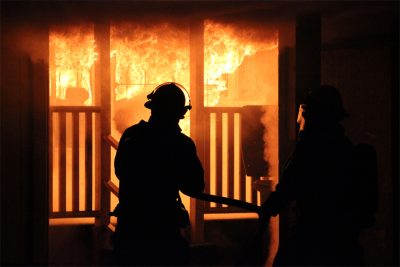Get the help you need right now 855-900-8437 Get Help Now
Get the help you need right now 855-900-8437 Get Help Now
July 25, 2018
Fire fighters and paramedics experience daily stress and trauma, which can increase their chances of developing a substance use disorder or mental health disorder. Even with the professional training fire fighters receive, the constant exposure to traumatic images of destruction, fire, injuries, violence and death can take its toll.
Managing your career, family, health and finances can be difficult enough. With the additional stressors that come with being an emergency responder, some fire fighters and paramedics misuse substances and alcohol to cope. The Substance Abuse and Mental Health Administration (SAMHSA), estimates that 30 percent of fire fighters show signs or symptoms of behavioral health conditions like post-traumatic stress disorders (PTSD). So, which comes first? The substance use disorder or the mental health condition?

Physical ailments such as a broken bone or infection can be easily diagnosed and treated, but a behavioral health condition is a little harder to observe. If you show signs of both a substance use disorder and a mental health disorder, the exact answer of what caused what can be more challenging to uncover.
In an article in the American Journal of Psychiatry, authors suggest that people with mental health disorders misuse substances as a form of self-medication. They choose their substances strategically — looking for the chemicals that can alleviate the symptoms they struggle with daily. For example, someone with anger issues might misuse opiate substances to soothe and sedate themselves, while someone with depression may choose to misuse cocaine to boost their mood.
While substance misuse may temporarily relieve some symptoms of a mental health disorder, it can also exacerbate the mental illness in the long run and cause physiological substance dependence. For example, if an individual chooses to abuse amphetamines to help with depression or fatigue caused by sleep deprivation, continued use of the substance could reduce dopamine production and further plunge the person into a deeper depression.
While addictions can sometimes worsen a mental illness that’s already in place, some people develop symptoms of mental disorders only after a period of sustained substance use. According to the National Institute on Drug Abuse (NIDA), people who are dependent on marijuana often have other mental health disorders including:
In some cases, marijuana and other illicit substances, such as PCP or other synthetic drugs, exacerbate an underlying predisposition to developing of schizophrenia and other psychoic disorders. In other words, the substance seems to awaken the disorder.
If you experiences signs and symptoms of both a substance use disorder and a mental health disorder it’s called a co-occuring disorder. There is often no way to determine which is the primary condition, but it has been confirmed that either one can develop first.
What can be understood about co-occurring disorders is that both conditions must be treated simultaneously for recovery. It wouldn’t be effective to treat PTSD if you continue to drink excessively, and it also wouldn’t be practical to enter sobriety if you still suffer from severe PTSD or major depression. The risk of setbacks becomes higher if you don’t resolve both issues.
A problem for many is that they seek help for one problem, but may be unaware of the need for treatment of another. Fortunately, there are treatment centers that specialize in treating fire fighters who have co-occurring disorders.
The road to recovery can be challenging, and recovery won’t occur overnight. Because of the nature of the fire profession, fire fighters may be at a higher risk of developing mental health and substance use disorders. The awareness is a large part of the battle to recognize when you need to reach out for help. If things don’t feel right, listen to your body and talk to someone. The the IAFF Center of Excellence can help you learn the skills that can help you work through current trauma and return to the career you love.